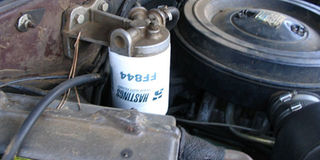How often should I replace my fuel filter?

The fuel filter traps particles, debris and impurities before they reach the fuel injectors. FILE PHOTO
What you need to know:
- Older generation gasoline car fuel filters can be replaced at slightly lower intervals while older pretty 2004 diesel engines have their filters replaced at every service.
- A fuel filter can also be replaced after an incident of accidental fuel contamination or fueling with adulterated fuel.
Hi Paul, I recently read your article where you recommended replacement of fuel filter as a possible fix to bad running of the engine. However, my mechanic says otherwise. He recently told me that the fuel filter for my Toyota Kluger does not need to be replaced until the pump has stopped working. I have tried to believe him but I feel there is something abnormal about the car. When should one replace the fuel filter? Kabali George
Hello George, periodic changing the fuel filter keeps the fuel pump and engine running well. The fuel filter traps particles, debris and impurities before they reach the fuel injectors.
Overtime fuel debris accumulating in the tank will clog the fuel filter. This causes strain and wear to the fuel pump which tends to work harder. Engine injectors get clogged by the debris which choke the tiny fuel passages.
This reduces fuel pressure and engine performance. Timely fuel filter replacement can help to avoid difficult engine starts, rough idling, stalling, sluggish acceleration and poor fuel economy.
You can know when to replace your fuel filter by referring to your car’s user manual. An online copy can be downloaded if unavailable.
Car manufacturers recommend guidelines for longlife fuel filters. Usually gasoline and diesel fuel filters of modern post 2000 cars are replaced between 80,000 and 100,000 kilometres.
Older generation gasoline car fuel filters can be replaced at slightly lower intervals while older pretty 2004 diesel engines have their filters replaced at every service.
A fuel filter can also be replaced after an incident of accidental fuel contamination or fueling with adulterated fuel.




